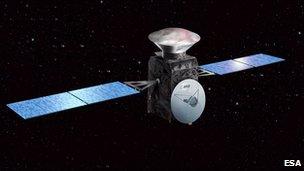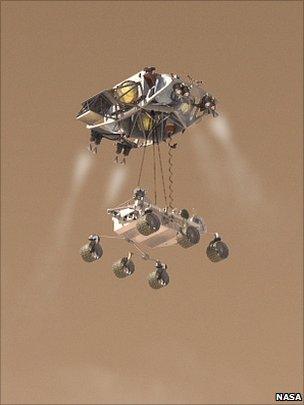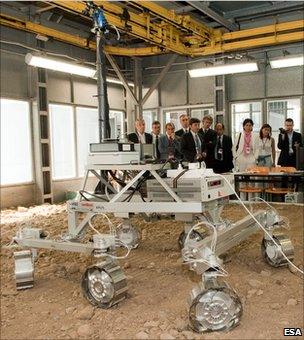Mars missions in summer slow lane
- Published

The 2016 orbiter would look for trace gases in the atmosphere of Mars
US and European efforts to send joint missions to Mars will stay in the slow lane over the summer while the Americans organise their finances.
European nations were hoping this week to release industry to start work on building an orbiter to hunt for methane in Mars' atmosphere in 2016.
But the full authority could not be given because Washington said it was not yet in a position to commit to the programme in its entirety, which includes sending a rover to the Red Planet two years later.
Faced with the Americans' uncertainty, European Space Agency member states decided not to issue an industrial contract to build the orbiter.
Instead, Esa will discuss with space companies what minimum works can be done on the project under existing arrangements to keep it on track - in the expectation that the US will come back with a proper commitment in September.
"It has been decided to take the minimum conservative measures to ensure no irreversible path is taken, and that those measures are taken within the existing contractual frame we have with the industry," said Eric Morel de Westgaver, the Paris-based agency's director for procurement.
The delay will be a worry for all concerned. Industry says the timetable for construction for the joint missions, particularly for the orbiter, is tight if launch dates are to be met; and that it cannot wait much longer to start fabrication of key components.
"We are already compressing the uncompressible", was how one industry official described the situation to the BBC at last week's Paris Air Show.

The Americans are supposed to be providing a rocket-powered skycrane to put the rover on Mars
And at the same event, Jean-Jacques Dordain, Esa's director general, acknowledged the programme did not have "months of margin".
Known in Europe as the ExoMars project, the joint venture between the agencies comprises two separate, but related, missions.
The first, to launch in 2016, is a satellite that would track down the sources of methane and other trace gases recently detected in Mars' atmosphere.
The presence of methane is intriguing because its likely origin is either present-day life or geological activity. Confirmation of either would be a major discovery.
Then, in 2018, the agencies plan to send a single large rover to the Red Planet - perhaps targeted at one of the most interesting sources of methane to investigate it further. It would drill below the surface, and look for signs of life on the planet. The rover may even cache rocks for return to Earth by a later mission.
The 2016 satellite would probably act as the surface vehicle's data-relay station to get its pictures and other information back to scientists.
The missions were a key topic for discussion this week at a meeting of the European agency's Industrial Policy Committee (IPC) - its "cheque writing" body.
It was expected that the IPC would be presented with a letter from Nasa Administrator Charles Bolden explicitly affirming his country's commitment to take part in the rover mission in 2018.

The ExoMars project was initiated by European space ministers six years ago
A letter from Washington did arrive, but not until after the start of the two-day gathering. And in the letter, Mr Bolden said Nasa was not yet in a position to promise to provide a rocket, an interplanetary cruise stage to take the 2018 rover to Mars, and a landing system to put it on the surface.
These were all elements the Americans said they would like to contribute when the idea of joint missions was first established.
In the eyes of Esa, the 2016 orbiter and the 2018 rover are one programme, and without a firm undertaking from the Americans on the latter part of the venture, the Europeans are reluctant to press ahead on the former part.
"Before we embark on spending a lot of taxpayers' money, we want to be sure we have the commitment of Nasa," Mr Morel de Westgaver told BBC News.
Mr Bolden did say in his letter that he would be working within the US government to get that commitment, and that he hoped to be able to deliver it to the IPC before it meets again in September.
For followers of European space affairs, the ExoMars initiative has been a long, drawn-out affair. It was originally approved as a concept by ministers in 2005, but then went through several iterations as scientists and engineers struggled to match their ambitions for the project to the funds available.
A decision to combine efforts with the Americans was taken when they too encountered budget pressures on their Mars Programme.
- Published8 March 2011